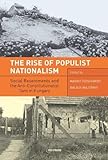The Rise of Populist Nationalism : Social Resentments and Capturing the Constitution in Hungary / ed. by Margit Feischmidt, Balázs Majtényi.
Material type: TextPublisher: Budapest ; New York : Central European University Press, [2020]Copyright date: 2019Description: 1 online resource (310 p.)Content type:
TextPublisher: Budapest ; New York : Central European University Press, [2020]Copyright date: 2019Description: 1 online resource (310 p.)Content type: - 9789633863329
- Constitutional history -- Hungary
- Constitutional law -- Political aspects -- Hungary
- Identity politics -- Hungary
- Nationalism -- Europe, Eastern
- Nationalism -- Hungary
- Political culture -- Hungary
- Populism -- Hungary
- Post-communism -- Hungary
- POLITICAL SCIENCE / Political Ideologies / Nationalism & Patriotism
- 21st century, Constitutional history, Constitutional law, Hungary, Nationalism, Political studies, Populism, Post-communism, Roma studies, Romanies
- 342.43902/9 23/eng/20240417
- JN2067
- online - DeGruyter
| Item type | Current library | Call number | URL | Status | Notes | Barcode | |
|---|---|---|---|---|---|---|---|
 eBook
eBook
|
Biblioteca "Angelicum" Pont. Univ. S.Tommaso d'Aquino Nuvola online | online - DeGruyter (Browse shelf(Opens below)) | Online access | Not for loan (Accesso limitato) | Accesso per gli utenti autorizzati / Access for authorized users | (dgr)9789633863329 |
Frontmatter -- Table of Contents -- Introduction -- Constitutional Continuity Disrupted -- Continuity, Discontinuity and Constitution- Making: A Comparative Account -- A Nation Torn Apart by its Constitution? Nationality and Ethnicity in the Context of the Hungarian Fundamental Law -- Towards an Illiberal Extraterritorial Political Community? Hungary’s “Simplified Naturalization” and Its Ramifications -- Shift in the Hungarian Roma Policy -- New Forms of Nationalism and the Discursive Construction of the Gypsy Other -- Civil Society and the Right-wing Radicalization of the Public Sphere in Hungary -- What Lies Beneath the Appeal of the Radical Right to Elite Skilled Workers? The Impact of Deeply Ingrained Nationalism and Perceptions of Multiple Exploitations1 -- Who Brings the Political Change? Divergent Understandings of Politics Among Politically Active Students -- List of Contributors -- Index
restricted access online access with authorization star
http://purl.org/coar/access_right/c_16ec
The authors of this book approach the emergence and endurance of the populist nationalism in post-socialist Eastern Europe, with special emphasis on Hungary. They attempt to understand the reasons behind public discourses that increasingly reframe politics in terms of nationhood and nationalism. Overall, the volume attempts to explain how the new nationalism is rooted in recent political, economic and social processes. The contributors focus on two motifs in public discourse: shift and legacy. Some focus on shifts in public law and shifts in political ethno-nationalism through the lens of constitutional law, while others explain the social and political roots of these shifts. Others discuss the effects of legacy in memory and culture and suggest that both shift and legacy combine to produce the new era of identity politics. Legal experts emphasize that the new Fundamental Law of Hungary is radically different from all previous Hungarian constitutions, and clearly reflects a redefinition of the Hungarian state itself. The authors further examine the role of developments in the fields of sociology and political science that contribute to the kind of politics in which identity is at the fore.
Mode of access: Internet via World Wide Web.
In English.
Description based on online resource; title from PDF title page (publisher's Web site, viewed 20. Nov 2024)


